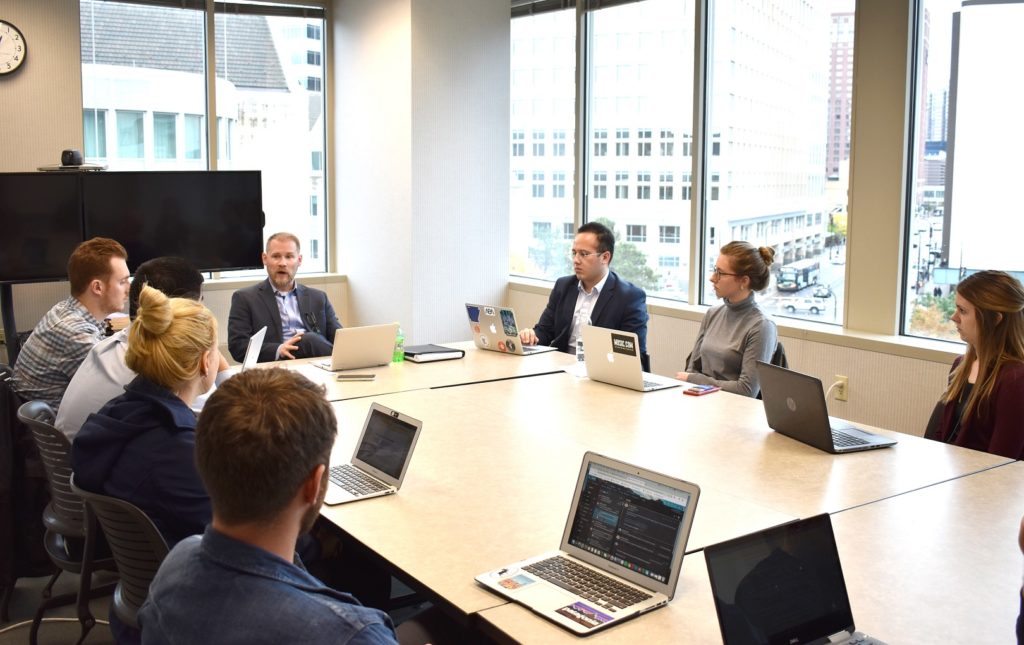This story is featured in the spring 2021 issue of St. Thomas Lawyer.
When it was founded, the University of St. Thomas School of Law made a commitment to become a leader in academic scholarship that expands society’s knowledge about the law and sheds light on complex legal problems. That commitment persists today.
Our outstanding faculty of teacher-scholars foster civil discourse, advocacy and publish research and articles that support innovation, facilitate legal reform, advance social justice, strengthen the connection between faith and the law, improve legal education and beyond. They are thought leaders in a wide range of areas of the law and their work has made and continues to make an impact.
In 2018, out of 200 law schools nationwide, St. Thomas School of Law’s world-class faculty ranked No. 23 for scholarly impact.
The work of the St. Thomas Law faculty also enhances the educational experience for law students, who are often invited to participate in the research and writing process, through which they gain invaluable skills and knowledge.
Read on to learn about our faculty members’ impact over the past 20 years.
Thomas Berg | JAMES L. OBERSTAR PROFESSOR OF LAW AND PUBLIC POLICY
Thomas Berg focuses his scholarship on religious liberty and, secondarily, intellectual property. He is co-editor of the leading religious liberty casebook and has written books, numerous articles and numerous briefs in the Supreme Court and lower courts on the subject. Berg founded and directs St. Thomas Law’s Religious Liberty Appellate Clinic, one of the nation’s first and few legal clinics for religious liberty. Recently, his amicus briefs, written with Douglas Laycock of the University of Virginia, served as roadmaps for Supreme Court majority opinions in Tanzin v. Tanvir and Masterpiece Cakeshop v. Colorado Civil Rights Commission. He is a leading national advocate for LGBTQ nondiscrimination protections with substantial religious exemptions. He also has pioneered Christian and other religious analyses of intellectual property and social justice issues.
Benjamin Carpenter | ASSISTANT PROFESSOR
Benjamin Carpenter’s primary research has focused on the effect of assisted reproduction on trust and estate law and, specifically, the interests of children conceived after the death of a parent through cryopreservation. His first article provided the first 50-state survey on this topic and was referenced at oral argument by Justice Stephen Breyer. Carpenter’s articles on the topic have been cited by the Michigan Supreme Court and Federal District Court for the Eastern District of Pennsylvania, and recommendations from his articles have been adopted in the Uniform Probate Code and a number of state probate codes. His current research addresses the enforceability of contracts between couples regarding rights to preserved genetic material.
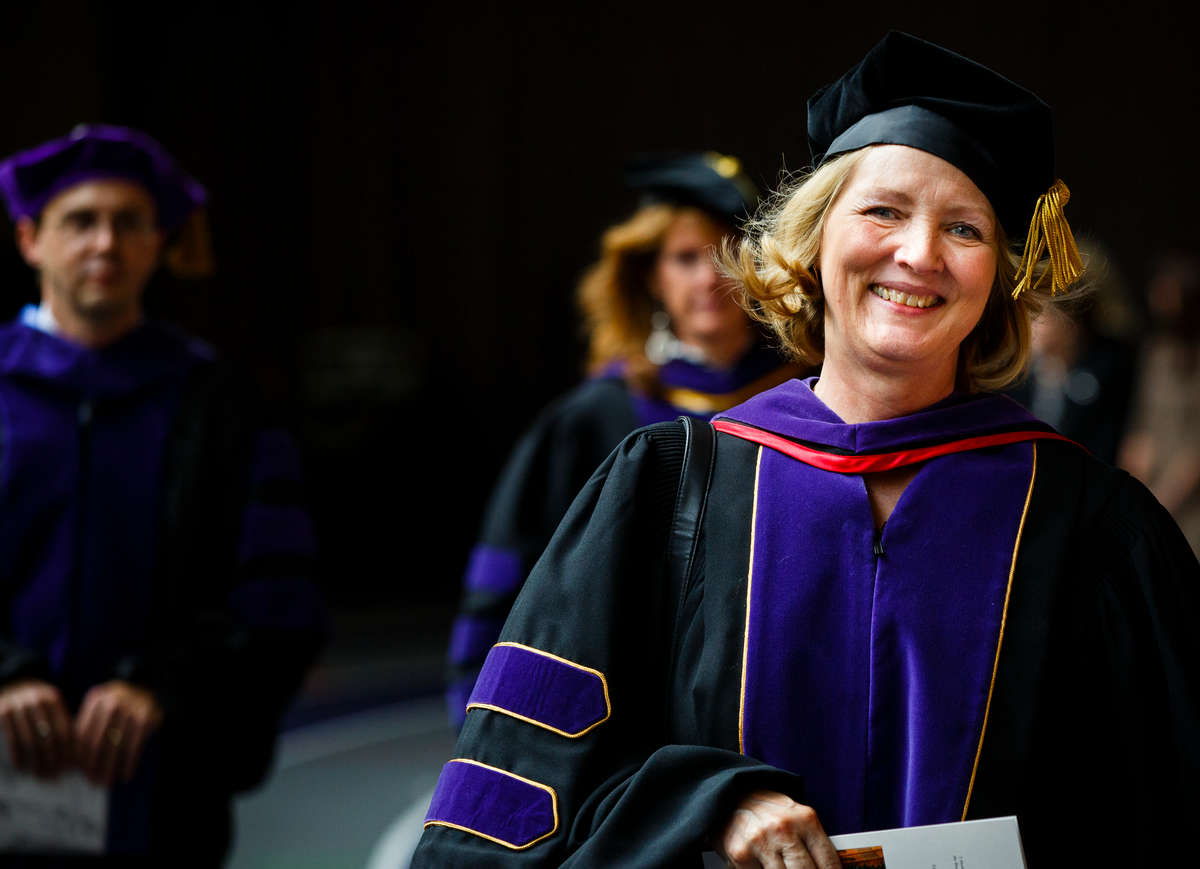
Teresa Stanton Collett (Mark Brown/University of St. Thomas)
Teresa Stanton Collett | PROFESSOR AND DIRECTOR OF THE PROLIFE CENTER
Teresa Stanton Collett’s scholarship regarding parental rights and abortion, as well as her article on fetal pain legislation, has resulted in nine invitations to testify before congressional committees, as well as numerous state legislative committees. It has also led to requests for representation defending abortion-related laws by state attorneys general in Kansas, New Hampshire and Oklahoma, and consultations with several others. Collett was appointed by Pope Emeritus Benedict XVI in 2009 and Pope Francis in 2016 as a consultor to the Pontifical Council for the Family, largely based on her articles regarding the nature and legal definition of marriage. Her early writing on legal ethics in estate planning is regularly cited by scholars and the authors of the most widely used Wills and Trusts casebook.
Mariana H.C. Gonstead | PROFESSOR, IDRR NETWORK EXECUTIVE DIRECTOR AND DEPUTY TO THE DEAN FOR INTERNATIONAL LEGAL STUDIES
Mariana H.C. Gonstead’s scholarship impacts collective innovation through participation. Participation increases engagement and channels discontent. Participation is the key to unlock the power of the whole in our families, businesses and communities. She said that without participation, it is impossible to build a world in which each of us, as children of God, can develop our full potential. It is a tragedy if we die unable to contribute our unique, entrusted gifts. We are created uniquely for a reason, so either God has committed as many errors as persons have existed, or we don’t get it yet. To address this, Gonstead’s work conceptualizes methods to develop capacities to co-create, increase cultural understanding, and enhance systems for conflict management and shared decision-making to reach higher levels of unity.
Mitchell Gordon | ASSOCIATE PROFESSOR
Mitchell Gordon’s scholarship focuses on connections between written constitutionalism, history and human rights. He views the Constitution and the Declaration of Independence not as a collection of unenforceable aspirations, but written guarantees addressed to the future – a “promissory note” (in Dr. King’s words) that we sometimes honor, sometimes ignore. Gordon is especially interested in promises that (despite being written) have been minimized, including the Ninth Amendment, the Republican Guarantee Clause, the Privileges or Immunities Clause and the Reapportionment Clause of the 14th Amendment. (Any of these, if revitalized, could revolutionize how the Constitution protects democracy and human rights.) Some of America’s leading constitutional scholars, and at least two federal circuit court judges, have favorably cited Gordon’s work.
Father Daniel Griffith | WENGER FAMILY FACULTY FELLOW AND CHAPLAIN OF THE TERRENCE J. MURPHY INSTITUTE FOR CATHOLIC THOUGHT, LAW, AND PUBLIC POLICY
Father Daniel Griffith is an active writer and speaker regarding Catholic social teaching, restorative justice, issues of justice in society and racial justice. In addition to his work at St. Thomas Law, he is pastor of Our Lady of Lourdes Catholic Church in Minneapolis and serves as the liaison for restorative justice and healing for the Archdiocese of Saint Paul and Minneapolis. Recent articles have focused on the Catholic church’s response to clergy sexual abuse and the effectiveness of restorative justice techniques in bringing about healing and changing culture within the faith. Working with Professor Hank Shea, Griffith looks to expand his teaching, training and community outreach activities to bring more restorative justice opportunities and benefits to St. Thomas, the Twin Cities and beyond.
Neil Hamilton | HOLLORAN PROFESSOR OF LAW AND CO-DIRECTOR OF THE HOLLORAN CENTER FOR ETHICAL LEADERSHIP IN THE PROFESSIONS
Since joining the founding group of law faculty in 2001, Neil Hamilton has focused his scholarship (57 law journal articles and two books with a third forthcoming in 2021 with Cambridge University Press) on building a national social movement in legal education to give more emphasis to each law student’s formation of an ethical professional identity. In March 2021, the growing movement influenced the American Bar Association’s (ABA) Council of the Section of Legal Education and Admissions to the Bar to unanimously recommend to the ABA House of Delegates a proposed revision to ABA Accreditation Standard 303 requiring that each law school “shall provide substantial opportunities to students for … the development of a professional identity.”
Lyman Johnson | PROFESSOR
Lyman Johnson’s scholarship is concentrated on business law. He is the nation’s leading legal scholar on officer duties and writes extensively on corporate fiduciary duties. Johnson’s publications are widely cited by influential judges and scholars, significantly shaping both law and scholarly thinking. For decades, Johnson was among a small handful of legal scholars insisting that corporations are not legally or normatively required to maximize profits or share price. His minority viewpoint has now become a mainstream position and is altering business practice. A portion of Johnson’s work explores religion and faith in the corporate world and how business leaders may (but do not have to) bring their beliefs to bear on business decisions as they fulfill their entrustment to serve.
Wulf Kaal | PROFESSOR AND DIRECTOR OF THE PRIVATE INVESTMENT FUND INSTITUTE
Wulf Kaal is a leading expert and the most widely published proponent of blockchain innovation in law and corporate governance, as well as dynamic regulation and associated regulatory applications to improve and expand innovation, including through blockchain technology and smart contracting. His empirical and theoretical scholarship in this context evaluates the evolution of law, regulation of disruptive innovation, the diminishing capacities of the regulatory infrastructure, the role of governmental contracts, the dynamic regulatory approaches for the financial services, the diminishing relationship between regulation and innovation, and the so-called "pacing problem" between regulation and innovation, among other issues. Possible dynamic regulatory mechanisms evaluated in Professor Kaal’s scholarship on dynamic regulation include blockchain technology, big data, contingent capital securities, governmental contracts, venture capitalist investment allocation and crowdfunding.
Robert Kahn | PROFESSOR
While at St. Thomas, Robert Kahn has worked to relate his scholarship to the broader world and human dignity. His early work focused on hate speech, cross burning and the Danish cartoons. In 2011, Kahn wrote an essay comparing bans on the burqa to 19th-century restrictions on Catholicism in the United States. In 2016, he wrote an article questioning police calls on the NFL and teams to punish professional athletes who made symbolic gestures calling attention to Ferguson and other instances of police violence against African Americans. More recently, Kahn has questioned the need for mask bans, and used the debate over mask mandates to question whether the same deference given mask abstainers might also be offered to other marginalized groups in our society.
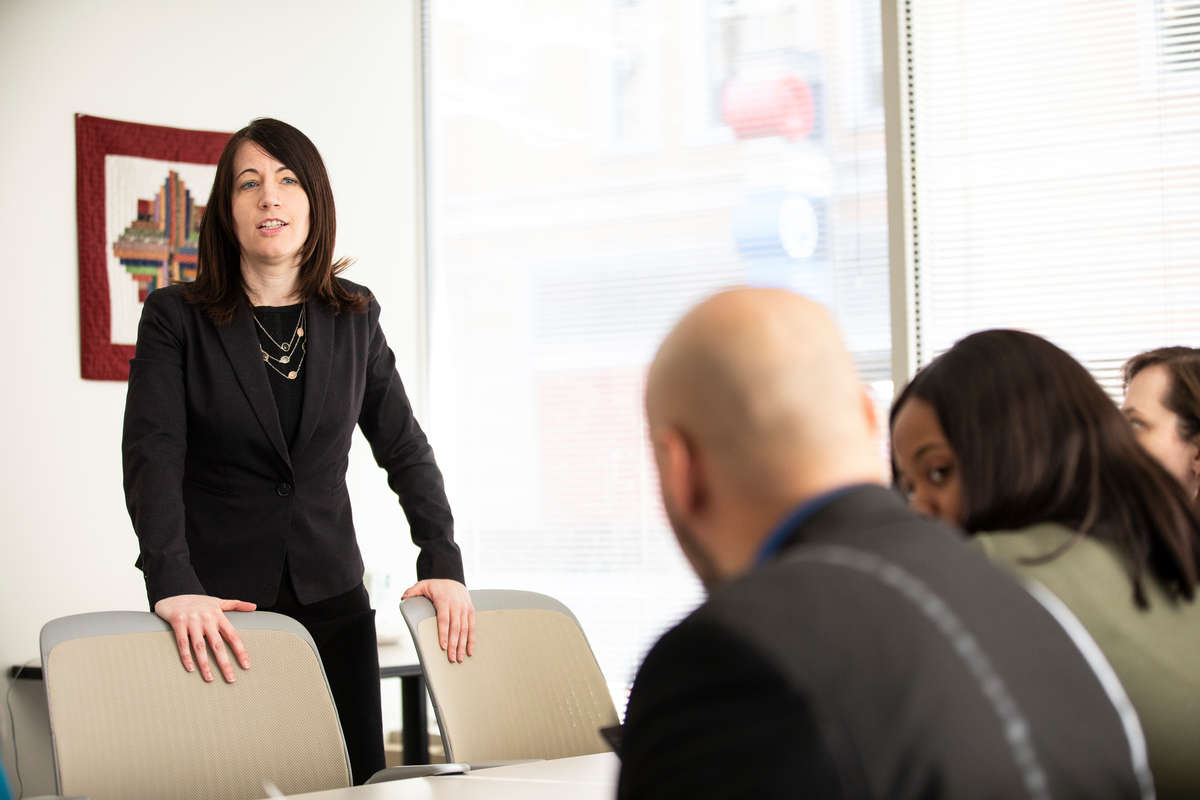
Rachel Moran (Mark Brown/University of St. Thomas)
Rachel Moran | ASSOCIATE PROFESSOR
Rachel Moran’s research focuses on police accountability and public access to information about police misconduct. This past year attorneys have cited her research in multiple federal courts of appeal and state courts addressing questions about whether to allow public access to records of police misconduct. Moran’s research has also been cited in testimony before the Oregon and Connecticut state legislatures about why legislation expanding public access is critical to policing reform; a written plan to reform policing in New York; and investigative reports exposing police accountability failures in Minnesota, Maine, New Hampshire and Oregon. The National Association of Criminal Defense Lawyers named her article "Police Privacy" a “must read” for lawyers attempting to gain access to information about police misconduct.
Joel Nichols | ASSOCIATE DEAN FOR ACADEMIC AFFAIRS AND PROFESSOR
Joel Nichols’ scholarship centers on the intersection of law and religion. His writing demonstrates both the capacities and limits of civil law, by explaining how sometimes religious norms (or religious law) have a greater hold on individuals and communities than civil law itself. Nichols challenges state law to grapple with the lived reality of faith and he also explores how principles of faith make their way (or don’t) into laws and judicial opinions that affect entire communities – in areas as diverse as First Amendment religion topics, family law, human rights and legal history. Nichols is deeply invested in legal education and the formation of students, both at St. Thomas and in the wider legal academy.
Jerry Organ | BAKKEN PROFESSOR OF LAW AND CO-DIRECTOR OF THE HOLLORAN CENTER FOR ETHICAL LEADERSHIP IN THE PROFESSIONS
Jerry Organ has been influential in changes among law schools nationwide regarding conditional scholarship programs and law student well-being. His research on conditional scholarship programs led the American Bar Association (ABA) to require law schools to provide admitted applicants with information about scholarship retention rates. As a result of this increased transparency, a significant number of law schools have moved away from conditional scholarship programs. In 2014, Organ and his co-investigator David Jaffe were able to secure modest funding from the ABA to support a survey on law student well-being. The results were published in 2016 and were a catalyst for the ABA’s National Task Force on Lawyer Well-Being.
Julie Oseid | MORRISON FAMILY DIRECTOR OF LAWYERING SKILLS AND PROFESSOR
Julie Oseid focuses her scholarly articles on how the writing techniques authors use in fiction, essays, speeches and letters can inspire and guide law students, lawyers and judges. She will happily devour the latest Pulitzer Prize winner, an article from The Atlantic or a new short story collection to understand the ways an author crafts an engaging, thought-provoking piece. Oseid believes that depth, clarity and storytelling are important characteristics in legal writing. She wants to help legal professionals not only improve their written communication skills, but also find joy in writing, and she has been called on by judges and scholars from across the country to share her insight.
Mark Osler | PROFESSOR AND ROBERT AND MARION SHORT DISTINGUISHED CHAIR IN LAW
Mark Osler’s writing on clemency has been part of a broad movement toward right-sizing sentences and reintroducing mercy into criminal justice. He has been a leader in bringing attention to the broken federal clemency system both locally and nationally. Osler has been sought out by three White House administrations regarding clemency reform and played a role in the Obama-era clemency initiative that commuted more than 1,700 sentences. He started the first legal clinic in the country devoted to federal commutations at St. Thomas Law, through which students petition on behalf of federal prisoners whose sentences are unduly harsh and unjust.
Michael Stokes Paulsen | DISTINGUISHED UNIVERSITY CHAIR AND PROFESSOR
Michael Stokes Paulsen is one of the most respected and influential Constitutional Law scholars in the United States. He has been ranked among the top 150 most cited legal scholars of all time in American scholarly works. Paulsen has published nearly 100 academic articles, including in the Harvard Law Review and Yale Law Journal. His co-authored casebook, The Constitution of the United States, has been adopted for over 170 law courses. His co-authored book, The Constitution: An Introduction, has sold more than 25,000 copies worldwide and is used in law, college and advanced high school classes. Paulsen is a recognized expert on constitutional interpretation, originalism, interpretive power, stare decisis, presidential power, war powers, impeachment and religious freedom. He is a prominent pro-life legal scholar on abortion.
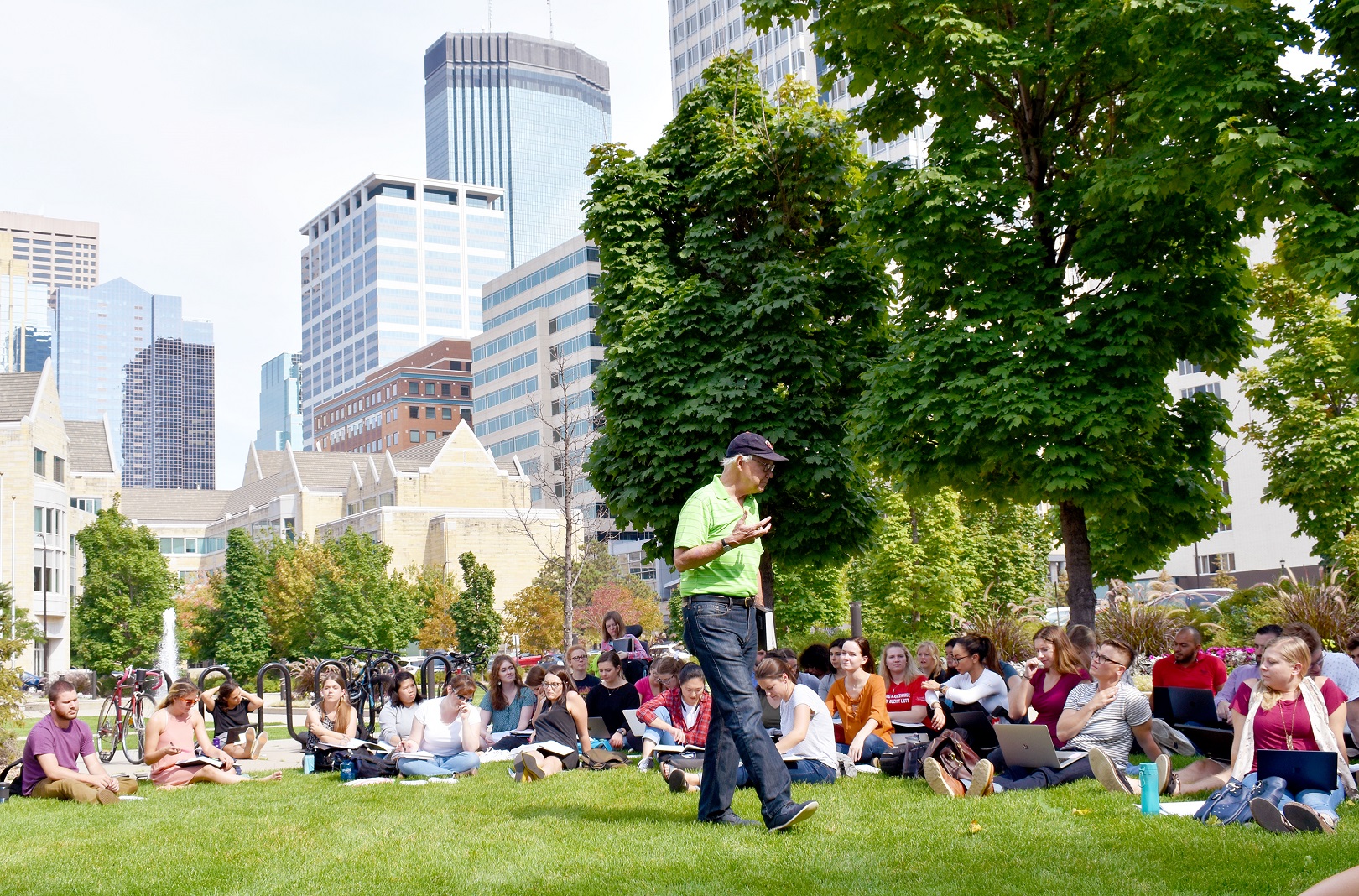
Charles Reid
Charles Reid, Jr. | PROFESSOR
Charles Reid is internationally recognized as a leading historian of Roman and canon law. He has spoken before the Norwegian Academy of Sciences and published in Russian, Czech and Italian venues and been sought out by the media throughout his career. Reid’s book Power over the Body, Equality in the Family: Rights and Domestic Relations in Medieval Canon Law revealed that medieval marriage law consisted of a network of rights. He suggested in the Bulletin of Medieval Canon Law and the Journal of Law and Religion ways in which the Catholic tradition might accommodate same-sex relationships. Reid’s article "The Transformation of English Legal Science: From Hale to Blackstone" that he co-authored with Harold Berman has been cited by federal courts of appeal.
Michael Robak | DIRECTOR OF THE SCHOENECKER LAW LIBRARY, ASSOCIATE DEAN AND CLINICAL PROFESSOR OF LAW
Michael Robak’s writing focuses on both educational technology (ed tech) and technology education (tech ed) and how the Law Library is best positioned to lead in these areas. His work helped shape the development of the American Bar Association’s TECHSHOW Academic track, called Next 20, that provides a distinct forum for law school faculty and students. TECHSHOW is one of the premier annual legal technology conferences and Next 20 is designed for attendees to “[l]earn from forward-thinking educators about how to address some of today’s most pressing challenges in the legal field ... and how legal education has and continues to adapt to modern practice and how it can inform the future of the profession.”
Elizabeth Schiltz | HERRICK PROFESSOR OF LAW AND THOMAS J. ABOOD RESEARCH SCHOLAR
Elizabeth Schiltz’s scholarly work explores issues including voting rights for the disabled, disability-selective abortions, the disability rights community’s opposition to the legalization of physician-assisted suicide, Minnesota’s racial imbalance in special education and the disparate impact of the COVID-19 pandemic on disabled people. Schiltz has collaborated with disability rights organizations such as the ARC, L’Arche USA, the National Catholic Partnership on Disabilities, the Minnesota Governor’s Council on Developmental Disabilities, the Minnesota Disability Rights Center and Dyslexia Advocates. She worked to develop the Governor’s Council Disability Justice website (disabilityjustice.org), which now receives more than 10,000 views monthly. This spring, Schiltz established a Special Education Clinic at St. Thomas Law to help underserved parents and children negotiate special education services.
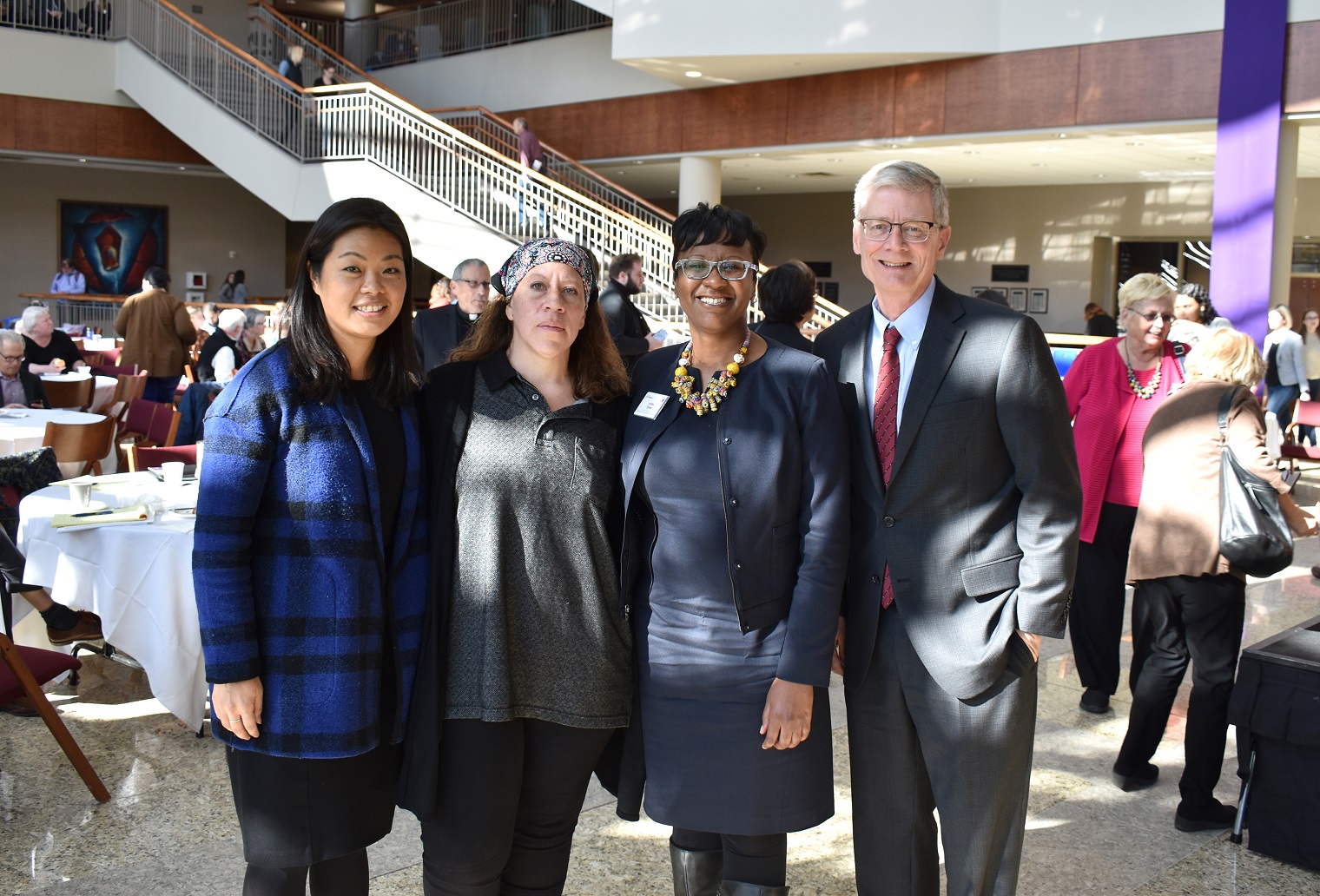
Hank Shea, right, with Dr. Artika Tyner and guest speakers at the 2019 law journal symposium, "Restorative Justice, Law and Healing."
Hank Shea | SENIOR DISTINGUISHED FELLOW, SCHOOL OF LAW; FELLOW, HOLLORAN CENTER FOR ETHICAL LEADERSHIP IN THE PROFESSIONS
Hank Shea has focused his writing in recent years on the use of restorative justice to address harm, ensure accountability and promote healing. Working with Father Daniel Griffith, he looks to expand his teaching, training and community outreach activities to bring more restorative justice opportunities and benefits to the St. Thomas Law community, the Twin Cities and beyond. In particular, Shea and Griffith will seek healing for those who have suffered from racial injustice and clergy sexual abuse. Shea will also continue to work for passage of the Veterans Restorative Justice Act in Minnesota, as part of his work with the Veterans Defense Project.
Gregory Sisk | PIO CARDINAL LAGHI DISTINGUISHED CHAIR IN LAW, PROFESSOR AND CO-DIRECTOR OF THE TERRENCE J. MURPHY INSTITUTE FOR CATHOLIC THOUGHT, LAW, AND PUBLIC POLICY
Gregory Sisk’s research focuses on government accountability for official wrongdoing, lawyer ethics, and empirical analysis of judicial decision-making. He has authored two West Academic hornbooks, Litigation with the Federal Government and Legal Ethics, Professional Responsibility, and the Legal Profession. The latter, published in 2018, was the first new hornbook published by West Academic on legal ethics in more than 30 years. Sisk regularly invites law students to co-author published works. His scholarly publications are frequently placed in the nation’s top law journals, such as Notre Dame, Michigan, New York University and University of Chicago, and are cited regularly in the courts.
Susan Stabile | SENIOR DISTINGUISHED FELLOW
Susan Stabile’s early scholarship focused on issues relating to employee benefit plans; her co-authored casebook is widely used by law schools and her co-authored book on ERISA Litigation is praised by practitioners. Her early criticisms of overreliance on employer securities in 401(k) plans helped bring attention to this issue, and in the aftermath of the Enron debacle she testified before Congress on the need for change. She also, like Lyman Johnson, argued for more social responsibility in corporate behavior, providing an important voice in opposition to the prevailing law and economics model and the misplaced emphasis on maximizing shareholder profit. In later years, her scholarship addressed the intersection of Catholic social thought and the law, bringing Catholic teaching to bear in a variety of legal areas.
Dr. Artika Tyner | CLINICAL PROFESSOR AND DIRECTOR OF THE CENTER ON RACE, LEADERSHIP AND SOCIAL JUSTICE
Dr. Artika Tyner’s scholarship focuses on creating practical solutions to long-standing racial justice issues from bridging the wealth gap to ending racial discrimination in the workplace. She is also an internationally recognized leadership scholar who is committed to training, inspiring and equipping the next generation of leaders. Tyner’s recent book, The Inclusive Leader: Taking Intentional Action for Justice and Equity, provides an in-depth look at the qualities of an inclusive leader, provides practical methods, and is an effective road map for success. She sets the benchmark for inclusive leaders, providing actionable items and the tools they need to be change agents and champions of justice for everyone.
Robert Vischer | DEAN AND MENGLER CHAIR IN LAW
Rob Vischer’s research explores the intersection of law, faith and professional identity. This is where conflicts arise between a provider’s religious liberty and a customer’s access to goods and services. He also explores liberty’s relational aspect – i.e., it’s not just individual versus state; our associations matter (a lot). Vischer has had a closely related focus on the moral dimension of legal practice, encouraging attorneys and law professors to acknowledge the ways in which a person’s moral perspective shapes their advice and advocacy. Vischer believes that moral and religious commitments are vital to our work, and they can only be sustained, expressed, and lived out through relationship. He has published two books with Cambridge University Press and three dozen law review articles and book chapters.
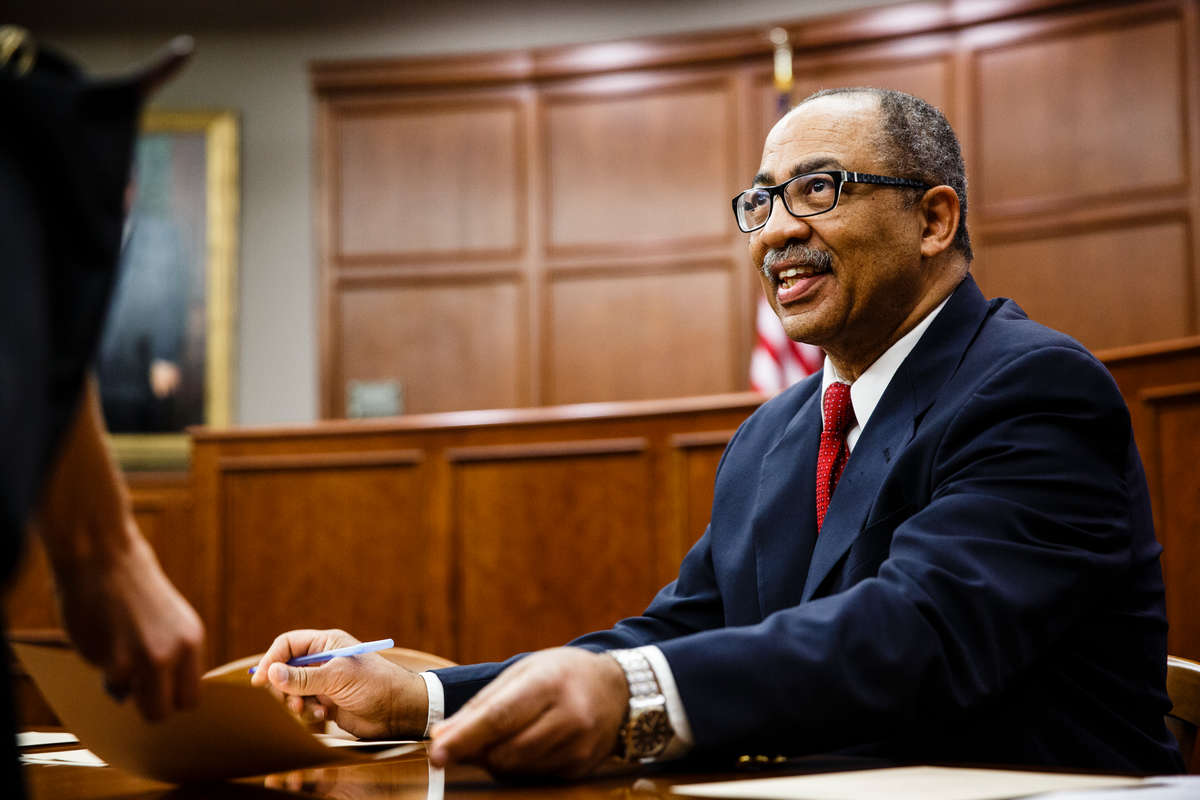
Carl Warren (Mark Brown/University of St. Thomas)
Carl Warren | CLINICAL PROFESSOR
Carl Warren has taught and been a frequent speaker on issues concerning race, civil rights, and the impact of bias on perception, judgment, the administration of justice and the practice of law. His current research and writing is focused on whether the ABA’s accreditation requirements should be revised to require law schools to teach students to be culturally competent, that is (1) to recognize the adverse assumptions individuals and groups make about race and other differences that distinguish people within our society; (2) to understand how such assumptions affect not only a lawyer’s personal perceptions and decision-making, but the perceptions and decision-making of others within our justice system; and (3) to be able to account for and counteract these effects in the representation of clients.
Virgil Wiebe | ROBINS KAPLAN DIRECTOR OF CLINICAL EDUCATION AND PROFESSOR
Virgil Wiebe created the image of a hotel with each floor representing different immigration statuses, with citizenship at the top and immigration detention in the basement. This image has served as a way to introduce students and the public to the confounding immigration system we have in the United States, on both technical and policy levels. Wiebe has also examined how the poor and marginalized often face high challenges, not only to securing immigration status but also to securing stable living situations. In addition, he has written on evidentiary standards in asylum cases, the role and impact of mental health providers in immigration adjudications, the humanitarian impact of cluster munitions and landmines, and the history of oaths and religious objection to oaths.
Yohuru Williams | DISTINGUISHED UNIVERSITY CHAIR, PROFESSOR AND FOUNDING DIRECTOR OF THE RACIAL JUSTICE INITIATIVE
Dr. Yohuru Williams is a nationally recognized expert on the civil rights and Black Power movements. His research focuses on the history of lynching, capital punishment and racial violence as well as the struggle for Black equality in the United States. The author, editor, and or co-editor of eight books, Dr. Williams’ scholarly articles have appeared in the American Bar Association’s Insights on Law and Society, The Journal of Urban History, The Organization of American Historians Magazine of History, The Black Scholar, The Journal of Black Studies, Pennsylvania History, Delaware History and the Journal of Civil and Human Rights. He is presently finishing a new book titled In the Shadow of the Whipping Post: Lynching, Capital Punishment, and Jim Crow Justice in Delaware 1865-1965.

